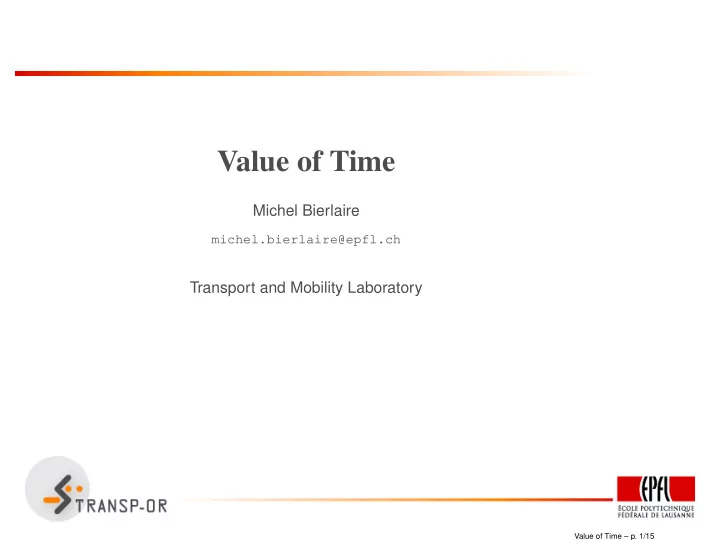

Value of Time Michel Bierlaire michel.bierlaire@epfl.ch Transport and Mobility Laboratory Value of Time – p. 1/15
Value of time Value of Time – p. 2/15
Value of time • What is the monetary value of travel time? • Cost - benefit analysis • Costs : CHF • Benefits : travel time savings • Definition: price that travelers are willing to pay to decrease the travel time. “Willingness-to-pay” • Motivation: total time budget is limited, saved time can be used for other activities and, therefore, has value. Value of Time – p. 3/15
Value of time Choice model U 1 = − βt 1 − γc 1 U 2 = − βt 2 − γc 2 with β , γ > 0 � �� � ≤ − β U 1 ≥ U 2 if c 1 − c 2 ( t 1 − t 2 � �� � ) γ ���� CHF CHF hours hours Value of Time – p. 4/15
Value of time • If utility function is linear • the value of time is the ratio between • the coefficient of the “time” variable, and • the coefficient of the “cost” variable • Warning: utility is not always linear • Value of time varies with • trip purpose • transportation mode • trip length • income Value of Time – p. 5/15
Value of time Example: model choice in Nijmegen : V car = − 0 . 798 − 0 . 110 · cost car − 1 . 33 · time car − 0 . 110 · cost train − 1 . 33 · time train V train = Value of time = -1.33 / -0.110 ≈ 12 euros / h ≈ 0.20 euros / min Case 1 Case 2 Time 2 h 1.5 h Cost 7 e 13 e Utility of train -3.43 -3.43 Value of Time – p. 6/15
Other willingness-to-pay indicators • Headway (i.e. time between two buses) • Number of transfers • Reliability • etc. Same methodology: • The model must involve the corresponding variable • Willingness-to-pay = ratio between the coefficient of the variable and the cost coefficient U = − βt − γc − αn Willingness-to-pay to have one less transfer: α/γ Value of Time – p. 7/15
Value of time in Switzerland Axhausen, K., Hess, S., Koenig, A., Abay, G., Bates, J., and Bierlaire, M. (2008). Income and distance elasticities of values of travel time savings: new Swiss results, Transport Policy 15 (3):173-185. Data collection: • Source for recruitment: survey “Kontinuierliche Erhebung zum Personenverkehr” (KEP) by SBB/CFF • Stated preferences • Questionnaire designed based on a real reference trip • Three parts: • SP mode choice (car / bus or rail) • SP route choice (current mode or alternative mode) • Socio-demographics and information about the reference trip Value of Time – p. 8/15
Value of time in Switzerland Value of Time – p. 9/15
Value of time in Switzerland Number of observations (1225 individuals) Business Commuters Leisure Shopping Total Mode : car/bus 6 162 186 126 480 Mode : car/rail 426 1716 2538 1104 5784 Route : bus for bus users 9 405 450 342 1206 Route : car for car users 156 846 1176 660 2838 Route : rail for car users 126 594 837 504 2061 Route : rail for rail users 324 1008 1881 288 3501 Total 1047 4731 7068 3024 15870 Value of Time – p. 10/15
Value of time in Switzerland Explanatory variables: • travel time • travel cost • level of congestion (car) • frequency (TC) • number of transfers (TC) • trip length • income • . . . Value of Time – p. 11/15
Value of time in Switzerland Explanatory variables: • . . . • inertia • car availability • sex • 1/2-fare CFF • general subscription • trip purpose Value of Time – p. 12/15
Value of time in Switzerland Business Commute Leisure Shopping Time TC (CHF/h) 49.57 27.81 21.84 17.73 Time car (CHF/h) 50.23 30.64 29.20 24.32 Headway (CHF/h) 14.88 11.18 13.38 8.48 CHF/transfer 7.85 4.89 7.32 3.52 Value of Time – p. 13/15
Value of time in Switzerland Value of Time – p. 14/15
Summary Value of time varies (namely) with • transportation mode, • trip purpose, • income, • trip length. Value of Time – p. 15/15
Recommend
More recommend